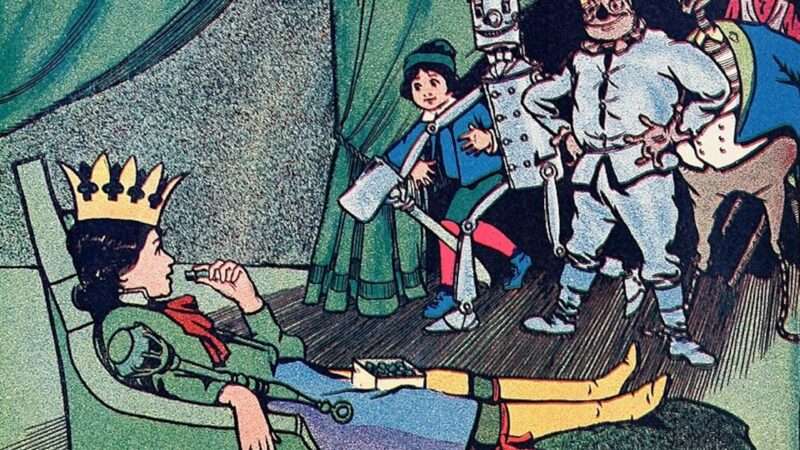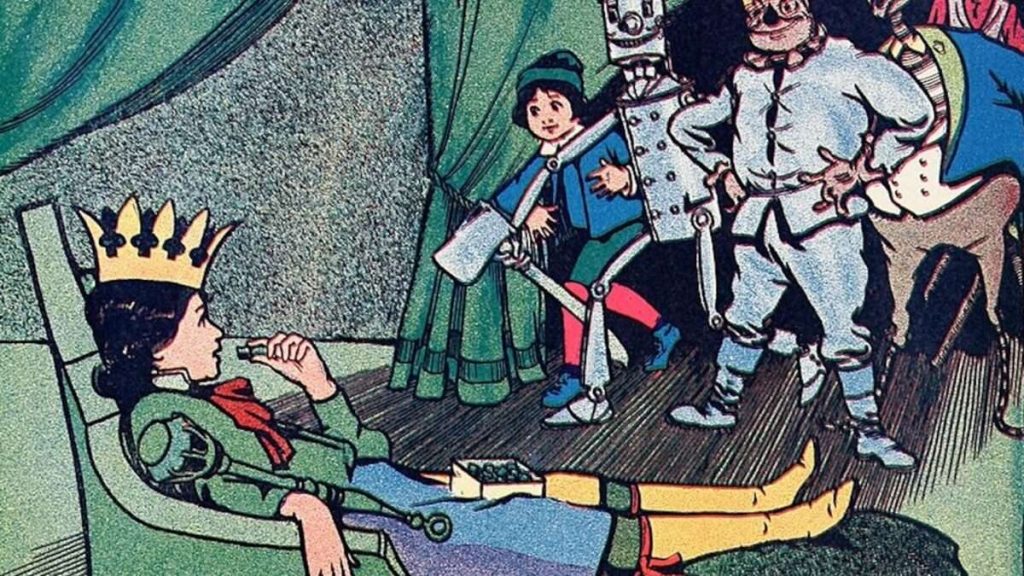
Long before Wicked reimagined the Witch of the West as a dissident resisting fascism, Oz was a hotbed of political commentary. No, I’m not referring to that dubious old tale that L. Frank Baum wrote The Wonderful Wizard of Oz as an allegory about the evils of the gold standard. As Michael Patrick Hearn pointed out long ago, the creator of Oz once published a poem endorsing the gold-backed dollar—”We will gain the world’s respect/When it knows our coin’s ‘correct’/And McKinley’s in the chair!”—which makes it unlikely that he’d produce a Populist parable. And while that leaves open the possibility, championed by the historian Quentin P. Taylor, that Baum was approaching the issue from a more gold-friendly angle, I don’t want to get lost just yet in the weeds of alleged symbolism. There’s plenty of overt commentary in Baum’s world to chew on before we start trying to decode things.
For example: In 1902, two years after The Wonderful Wizard of Oz appeared, Baum and some collaborators loosely adapted it into a musical filled with topical jokes. At one point in the play, the Wizard offers the Scarecrow the brain of Republican powerbroker Mark Hanna; at another, the Scarecrow cracks that he might be related to Secretary of State John Hay. One character is an anarchist annoyed that his bargain-sale bombs don’t work.
Two years after that, Baum wrote a second Oz novel, The Marvelous Land of Oz, that spoofs the suffragette movement: When an all-girl “Army of Revolt” seizes the Emerald City, its members seem chiefly interested in matters like acquiring jewels and gowns—and when they are ultimately defeated, they’re happy that they no longer have to eat their husbands’ cooking. Baum gave the story a feminist ending, though: Once the rightful political order has reestablished itself, Oz’s most powerful figures are two benevolent women, making the place a sort of matriarchy.
By the sixth book in the series, The Emerald City of Oz (1910), Baum was presenting the fairyland as a socialist utopia:
There were no poor people in the Land of Oz, because there was no such thing as money, and all property of every sort belonged to the Ruler. The people were her children, and she cared for them. Each person was given freely by his neighbors whatever he required for his use, which is as much as any one may reasonably desire. Some tilled the lands and raised great crops of grain, which was divided equally among the entire population, so that all had enough….If by chance the supply ever ran short, more was taken from the great storehouses of the Ruler, which were afterward filled up again when there was more of any article than the people needed.
Every one worked half the time and played half the time, and the people enjoyed the work as much as they did the play, because it is good to be occupied and to have something to do. There were no cruel overseers set to watch them, and no one to rebuke them or to find fault with them. So each one was proud to do all he could for his friends and neighbors, and was glad when they would accept the things he produced.
“I do not suppose such an arrangement would be practical with us,” Baum added, “but Dorothy assures me that it works finely with the Oz people.”
Another Baum book, The Sea Fairies (1911)—not officially an Oz novel, but the protagonists would later cross over to the Oz series—includes a scene where an octopus is offended that anyone would think he resembles Standard Oil. “Just because we have several long arms and take whatever we can reach,” he says, “they accuse us of being like— like— oh, I cannot say it! It is too shameful, too humiliating.”
Baum died in 1919, but his creation kept growing: Everyone from David Lynch to Robert Heinlein to the Muppets has issued Oz sequels, prequels, riffs, reimaginings, parodies, and adaptations, and these too have often taken on political shadings. When The Wiz transformed The Wonderful Wizard of Oz into an all-black musical, for instance, it was 1975, right in the aftermath of the 1960s liberation movements; songs like “Everybody Rejoice” and “Y’all Got It” gave the show a theme of now that we have our freedom, we need to take care of ourselves. (Or at least it gave the play that theme. The Wiz movie went in a different direction.) And then there’s Gregory Maguire’s dark 1995 novel Wicked, which is explicitly about the ways governments use social scapegoating to expand their power. When Wicked became a Broadway musical eight years later, the story became more kid-friendly but it didn’t lose its antiauthoritarian theme. It even sprinkled in a few new political references, as when one witch describes another witch’s death as “regime change.”
And that’s just the politics that writers intended to put into their Oz stories. Audiences are constantly adapting texts for their own ends, and stories can take on meanings that the authors never intended. (If you really, really want to read The Wonderful Wizard of Oz as an attack on the gold standard, nothing’s stopping you.) The Marvelous Land of Oz has a plot twist where we learn that the story’s boy hero was actually born a girl but was gender-swapped in infancy by a cruel witch; in the end, the character then becomes a girl again, and she happily remains one for the rest of the series. It’s safe to say that L. Frank Baum, writing in 1904, was not trying to make a statement about trans rights, but for years the story has been understandably popular with trans people.
Of course, that ending could also be cast as a detransition narrative—and inevitably, you can find folks online who read it that way.
A similar pair of competing readings has started to bedevil Wicked: Part 1, the hit movie based on the first half of the Wicked stage play. The film is obviously about the evils of authoritarian rule. But different audiences have been treating it as an either anti-Trump or pro-Trump fable, depending on who exactly they see as an authoritarian threat.
The anti-Trump readings are easier to find. For Constance Grady at Vox, “the Wizard suggests…Trump: a leader consolidating his power by scapegoating marginalized groups and slowly but surely denying them their rights.” For Salamishah Tillet of The New York Times, one character’s apparent decision to side with the Wizard “holds echoes [sic] of our recent presidential election.” Countless other writers have taken similar approaches to the movie, and the film’s own director has embraced this interpretation.
Yet liberals do not “own the imagery of subversion and outsiderness,” as one liberal pundit—Thomas Frank—once put it. Given that Wicked presents Elphaba, the so-called Wicked Witch of the West, as a misunderstood hero maligned by media propaganda, a MAGA Wicked riff practically writes itself:
Born to the establishment but despised by it, Elphaba arrives at an elite university where children of privilege talk about wanting to help the downtrodden—but this turns out just to be a mask for helping themselves. (In one wry moment, a character talks a big game about offering her solidarity to the oppressed but all she actually does is change a name.) Worse yet: When she travels to the Emerald City, Elphaba discovers that Oz’s government is a rotten institution built on lies. The dictatorial Wizard tricks her into creating an army of flying spies—an aerial surveillance state—to hunt for what the Wizard calls “seditious” activities. But Elphaba defies the deep state, and…
…well, you can fill in the rest. (Did I mention that in Maguire’s novel, characters periodically accuse Elphaba of trafficking in conspiracy theories?) So far, the pro-Trump spin on Wicked has shown up mostly on social media, but Steve Krakauer has presented it at op-ed length in The Hill and I won’t be surprised the idea turns up elsewhere too.
Look: I don’t see Trump as an Elphaba figure, but someone with a less critical take on the man could certainly project him onto that role. And if that person also sees a certain resemblance between the Wizard’s regime and some of the institutions that many #Resistance types have felt the need to defend…well, I can’t say I disagree about that part.
But if you do disagree, that’s fine. Oz has been in the public domain since 1956. It belongs to all of us, to read, misread, or rewrite any way we please.
The post The Socialists and Suffragettes of Oz appeared first on Reason.com.







